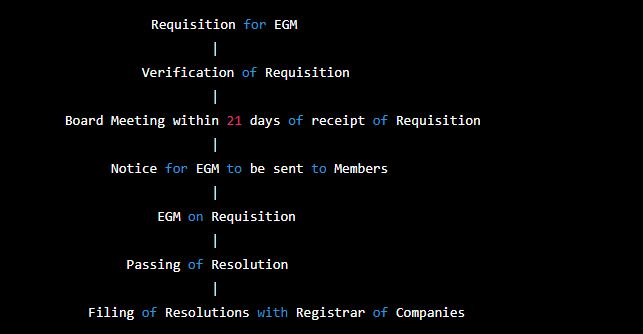
Introduction to EGM on Requisition by Members
An Extraordinary General Meeting (EGM) of a company on a requisition can be called for by the members of the company who hold at least 1/10th of the total voting power or shares of the company. This meeting can be called for a specific purpose and should be held within 21 days from the date of receipt of the requisition.
EGM on Requisition would be easily understandable through this write-up.
An extraordinary general meeting (EGM) of a company is a meeting of the shareholders of a company that is held for a specific purpose. Unlike an annual general meeting (AGM), which is held once a year, an EGM can be called at any time, usually to deal with urgent matters or important business matters that cannot wait until the next AGM but EGM on Requisition has another path.
Table of Contents
The process for calling an EGM on requisition as per the Companies Act 2013 is as follows:
- Requisition: A written requisition must be sent to the board of directors of the company, signed by the members who hold at least 1/10th of the total voting power or shares of the company. The requisition must state the purpose for which the meeting is to be called.
- Notice: Upon receipt of the requisition, the board of directors must call for the EGM and give at least 21 days’ notice to all the members of the company, specifying the date, time, and place of the meeting, along with the agenda.
- Advertisement: The company must also advertise the EGM in the newspapers, which are in circulation in the district where the registered office of the company is situated.
- Quorum: The quorum for the EGM is as per the company’s articles of association, but it cannot be less than five members present in person. The members who have requisitioned the meeting must be present or represented at the meeting to constitute a valid meeting.
- Conduct of the meeting: The chairman of the board of directors or in his absence, any other director nominated by the board will preside over the meeting. The members present at the meeting can discuss and transact only the business stated in the notice.
- Resolutions: The members present at the EGM can propose resolutions and vote on them. A resolution passed at the EGM is deemed to be an ordinary resolution unless it is specifically required to be passed as a special resolution as per the Companies Act 2013 or the company’s articles of association.
- Filing: The company must file a copy of the notice and the proceedings of the EGM with the Registrar of Companies within 30 days of the meeting.

Here is a visual representation of the chart for the process of EGM on requisition:
Requisition of EGM -> Notice of EGM -> Conducting the EGM -> Passing Resolutions -> Filing of Resolutions -> Implementation of Resolutions.
Table summarizing the differences between an EGM and an EGM on Requisition:
| Contents | EGM | EGM on Requisition |
| Called by | Board of Directors or members’ request | Members who hold a certain percentage of the voting power |
| Agenda | Set by the board of directors | Set by members who requisitioned the meeting |
| Chairperson | Chairperson of the board or nominated | Chairperson nominated by requisitionists |
| Procedures | Governed by Articles of Association | Governed by the Companies Act 2013 |
| Validity of the meeting | Depends on quorum and notice requirements | Depends on strict compliance with the Companies Act 2013 |
The importance of EGM on Requisition can be understood from the following points:
- Empowers Shareholders: EGM on requisition empowers shareholders to call for a meeting to discuss specific issues. This ensures that the interests of shareholders are protected, and they have a say in the decision-making process of the company.
- Offers Flexibility: Unlike an AGM, which is held once a year, an EGM can be called at any time, depending on the requirements of shareholders. This flexibility helps in resolving critical issues quickly, without waiting for the next AGM.
- Resolves Critical Issues: EGM requisition can be used to resolve critical issues that require immediate attention, such as changes in the company’s articles of association, the appointment of directors, or issues related to mergers and acquisitions.
- Promotes Transparency: EGM on requisition promotes transparency and accountability in the functioning of the company. The company has to disclose all relevant information related to the issues to be discussed at the meeting, ensuring that shareholders are aware of all the facts.
- Increases Corporate Governance: EGM on requisition plays an important role in enhancing corporate governance practices. It ensures that the decision-making process is transparent and that the interests of all stakeholders are taken into consideration.
Compliances After EGM on Requisition:
After the EGM on Requisition has been conducted and all the necessary compliance requirements have been met, the company needs to take certain steps to ensure that the decisions taken at the meeting are implemented in a timely and effective manner. The following are some of the post-compliance steps that need to be taken:
- Circulation of Minutes
The minutes of the EGM must be prepared within 30 days of the meeting and circulated to all the members of the company. The minutes should contain a record of the business transacted at the meeting, the decisions taken, the voting pattern, and any other important matters discussed during the meeting.
- Filing of Resolutions
The company must file a copy of the resolutions passed at the EGM with the Registrar of Companies (ROC) within 30 days of the passing of the resolution. The resolution must be filed in the prescribed form along with the necessary fees.
- Updating Statutory Registers
The company needs to update its statutory registers, such as the Register of Members, Register of Directors, Register of Charges, etc. within 30 days of the passing of the resolution. Any changes in the company’s share capital or directorship should also be reflected in these registers.
- Compliance with Other Laws
The company needs to ensure that it complies with all other applicable laws and regulations, such as tax laws, labour laws, environmental laws, etc. This may require the company to take certain additional steps, such as obtaining necessary approvals, filing periodic returns, paying taxes, etc.
- Implementation of Decisions
The decisions taken at the EGM must be implemented in a timely and effective manner. This may require the company to take certain actions, such as issuing new shares, appointing new directors, changing the company’s articles of association, etc.
- Communication with Stakeholders
The company needs to communicate the decisions taken at the EGM to all its stakeholders, such as employees, suppliers, customers, investors, etc. This may require the company to issue press releases, hold meetings with stakeholders, send out newsletters, etc.

Conclusion
In conclusion, EGM on requisition is an essential provision under the Companies Act, 2013, which empowers shareholders to call for a meeting to discuss critical issues that require immediate attention. It promotes transparency and accountability in the functioning of the company and helps in enhancing corporate governance practices.
Convening an EGM on Requisition requires compliance with certain legal procedures, and once the meeting has been conducted, the company needs to take certain post-compliance steps to ensure that the decisions taken at the meeting are implemented effectively. By following these steps, the company can ensure that its operations are conducted in a transparent and lawful manner and that its stakeholders are kept informed of important developments.
References
- https://icsi.edu/media/portals/86/Geeta_Saar_37_Extraordinary_General_Meeting.pdf
- 10 Useful Diff Shareholders and Directors
